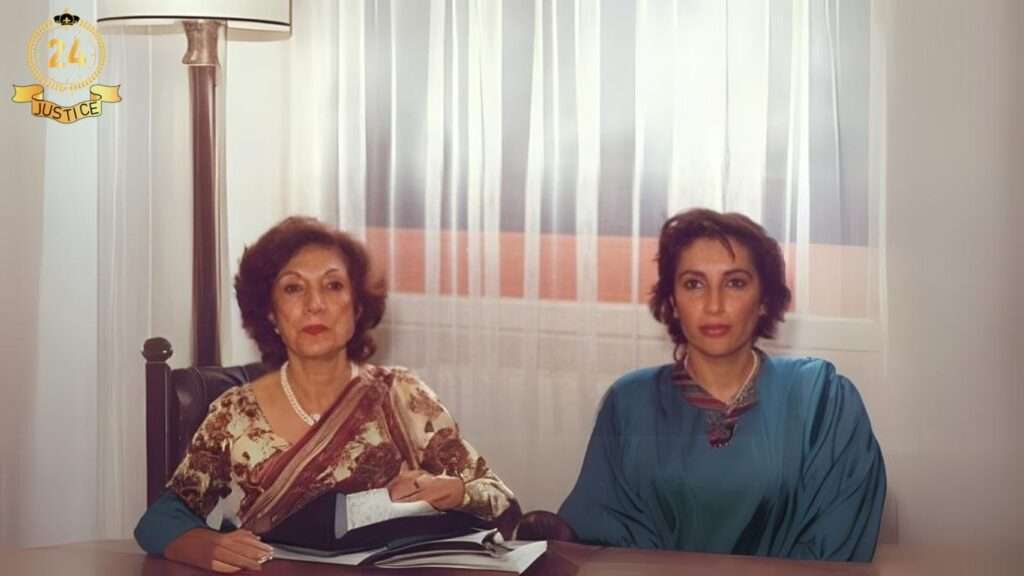Federal Shariat Court Protects Begum Nusrat Bhutto’s Trust
Many of us are familiar with the Bhutto family and their long history in Pakistani politics. But a lesser-known chapter involves a legal battle fought by Benazir Bhutto to protect a charitable trust established by her mother, Begum Nusrat Bhutto. This case, decided by the Federal Shariat Court in 2010, highlights the important role of the judiciary in upholding justice and Islamic principles.
The People’s Foundation Trust: A Legacy of Giving
Following the 1977 military coup led by General Zia-ul-Haq, the Bhutto family faced political persecution. But before that, Begum Nusrat Bhutto, along with her children Benazir and Murtaza, established the People’s Foundation Trust.
This charitable organization aimed to promote social welfare activities and was funded with a donation from the Head of the United Arab Emirates. The Trust was legally registered, demonstrating its commitment to transparency and accountability.
Martial Law’s Shadow Falls: A Challenge to the Trust
However, with the imposition of Martial Law, the Trust faced a direct attack. The military government froze the Trust’s bank accounts and took over its administration. This action, motivated by political animosity against the Bhutto family, left the Trust’s charitable work in jeopardy.
Benazir Bhutto Fights Back: Seeking Justice Through the Shariat Court
Benazir Bhutto, determined to protect her mother’s legacy, challenged these Martial Law Orders in the Federal Shariat Court. The petition argued that the government’s actions violated several Islamic principles and fundamental rights.
Key Arguments in the Case
- Violation of Islamic Principles The petition pointed out that the Martial Law Orders went against Islamic principles of justice, fairness, and freedom of property ownership. Additionally, the seizure of Trust assets without due process contradicted Islamic teachings on legal procedure.
- Constitutional Rights Benazir Bhutto’s lawyers argued that the government’s actions violated the Pakistani Constitution’s guarantees of due process and protection of property. They presented evidence from the Quran and the traditions of Prophet Muhammad (PBUH) to support their claims.
The Government’s Defense
While acknowledging the Islamic principles presented by the petitioners, the government’s defense was weak. They avoided directly addressing whether the Martial Law Orders violated these principles. This hesitant defense exposed the government’s shaky legal ground.
The Court’s Verdict: A Victory for Justice
- Federal Shariat Court Delivers Landmark Judgment The court’s decision in this case was significant and set a precedent.
- Scrutiny Under Islamic Principles The Martial Law Orders were examined based on Islamic principles like justice, honoring trusts, legal capacity (authority to act), and ensuring laws aren’t applied retroactively.
- Lack of Due Process The Court found the Orders were issued without following proper legal procedures, providing adequate notice, or allowing the right to appeal.
- Violation of Islamic Teachings These actions by the government were declared to be against the core principles of Islam.
Precedents and the Court’s Authority
The Court also cited previous judgments from superior courts that established its authority to review regulations, including Martial Law Orders, for conformity with Islamic law. This decision reaffirmed the Federal Shariat Court’s crucial role in upholding Islamic principles within the legal framework of Pakistan.
Justice Prevails: Trust Restored to the Bhutto Family
The Court’s verdict declared the Martial Law Orders null and void. This meant the Trust’s assets and management were rightfully returned to the Bhutto family, as per the laws existing before the imposition of Martial Law.
Significance of the People’s Foundation Trust Case
This case transcends the Bhutto family’s history. It serves as a powerful example of the judiciary’s role in upholding justice, protecting individual rights, and ensuring that those in power are held accountable. The emphasis on non-discrimination and the importance of following due process are crucial lessons for all citizens.
A Beacon of Hope: Upholding Islamic Principles
More importantly, the verdict highlighted the judiciary’s power to act as a check on arbitrary executive actions. It demonstrated that even under challenging circumstances, Islamic principles and the rule of law can prevail.
The Federal Shariat Court’s decision in this case serves as a beacon of hope for all those who believe in a just and equitable society based on Islamic values and the Pakistani Constitution.
Contact Us
We believe that legal awareness is essential for every citizen. This case summary serves as a reminder that the law protects everyone, regardless of background or political affiliation. We encourage our readers to stay informed about their legal rights and to seek justice whenever necessary.
By understanding landmark judgments like this one, we can all contribute to building a stronger and more just Pakistan. The PDF for the Full citation is below for reference.
Our panel of skilled Lawyers in Pakistan specializes in civil cases in Pakistan and offers personalized advice and robust legal solutions.
- AI Legal Site: For general information, visit 24Justice.com – Pakistan’s First Legal AI Site.
- Personalized Assistance: For more specific queries or legal representation, reach out to us:
- Call: 0092 308 5510031
- WhatsApp: 0092 308 5510031
- Contact Form: Prefer writing? Fill out our contact form below, and we’ll respond promptly.
[wpforms id=”4658″]



